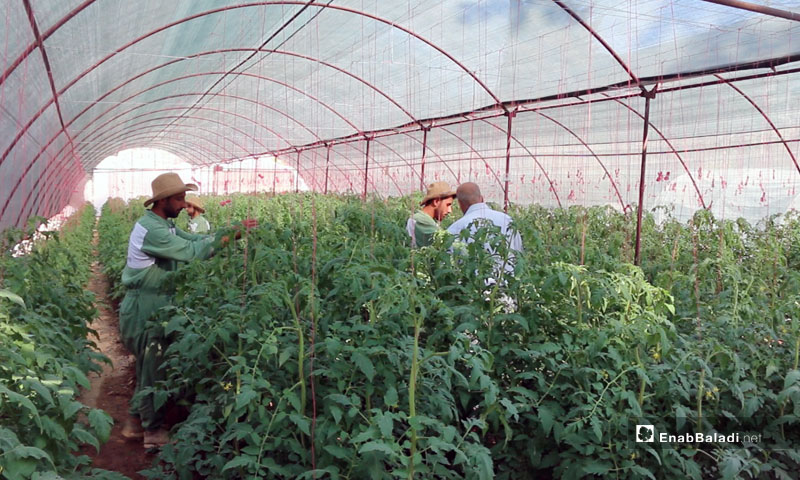



Projects initiated by humanitarian organizations operating in northern Syria are diverse and although they do not fully meet the needs of the population, particularly the displaced, their work is considered fundamental under the circumstances imposed on the areas including shelling and fighting which have caused waves of displacement, in addition to numerous abandoned homes and jobs.
Rahma Humanitarian Foundation (Mercy), active in Idlib province, is carrying out several projects, among which is the Greenhouse project in western rural Idlib, targeting the displaced persons living in the camps on the borders with Turkey after they left their houses and lost their jobs, as well as the opportunities they once had.
The Rahma Foundation member Mohammed Fares pointed out that the project aims at providing suitable jobs to the largest number of the displaced on one hand and supplying people with vegetables in winter on the other, opening up, thus, a new field of work.
Fares also told Enab Baladi that the foundation’s goal is not to make revenues, but to recover the costs it invested in the project, including the production costs, indicating that “the project’s profit is, then, to cover the expenses of the project’s staff and their families.”
“We have hired seven workers for each greenhouse, but commercially speaking three workers are enough to take care of a greenhouse. Moreover, we can use this project’s products for other projects dedicated to the displaced such as distributing meals made of our food products, instead of buying vegetables from the market.”
Additionally, Fares mentioned that the Rahma Foundation conducted a practical experiment involving the Greenhouse project last summer, planting a small section with tomato seedlings. The production and the results of the experiments were good.
“On this basis, we planted four greenhouses with tomato seedlings, and each house is expected to produce between 15 to 20 tons. If the production matches the plan, we will launch similar projects in different areas of Idlib and Aleppo at the beginning of the new year for supporting the workforce, providing the displaced with job opportunities and supplying the local markets with vegetables. All this seeks the good of the people […]. The prices of vegetables grown in Syria will be cheaper than the imported ones, due to the absence of freight and transport costs,” added Fares.
Khaled, one of the Greenhouse Project’s staffers, told Enab Baladi that he has worked within the foundation’s project since its inception in the past months. In the early stages, he learned how to take care of the seedlings as well as cutting, spraying, fertilizing and irrigating them, and later he moved to do more organized work with several young people.
Khaled works five days a week, he highlights, explaining that two workers guard the greenhouses on a daily basis to respond in case of an emergency.
Moreover, Khaled explained that the monthly salary of young people working in the project is up to 80 thousand Syrian pounds, the equivalent of $150 per month, “a good income for the displaced persons living in difficult conditions and lack of employment opportunities.”
Displaced persons in the western rural areas of Idlib suffer from dire living conditions, dictated by the battles held by the Syrian regime forces and Russia in the province, and the resulting massive waves of displacement, which culminated in the months of July and August.
Several families returned to their lands after the recent ceasefire, however, they got jeopardized by the presence of the unexploded bombs, ready to blast any moment. Furthermore, the agricultural work requires constant care which is difficult to do if there is shelling, triggering farmers to leave their lands and be [re]displaced.
if you think the article contain wrong information or you have additional details Send Correction